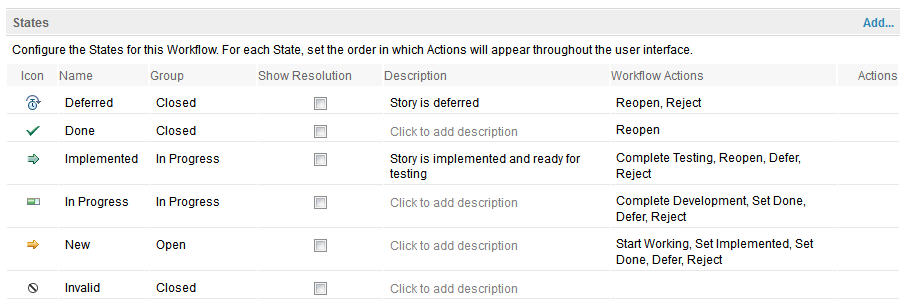Out of the box reports: Need explanations
|
We use out of the box reports (for now) with RTC 3.0.1, and our users especially love the dashboard widgets. However, the extremely short explanations on the widget chooser do not explain enough of what the report/chart shows nor the data it uses to get to the results displayed. Currently I'm looking for an explanation of the Team Velocity chart which is not responding as expected according to its description.
Is there anywhere these reports are more clearly defined? I found a wiki page that tells me a tiny bit more ( https://jazz.net/wiki/bin/view/Main/ReportsOutOfTheBox20 ) but that does not explain the reports. |
Accepted answer
One other answer
|
Hi Donna, for project velocity reports, see http://pic.dhe.ibm.com/infocenter/clmhelp/v4r0m3/index.jsp?re=1&topic=/com.ibm.team.reports.doc/topics/c_ccm_check_velocity.html&scope=null.
For other RTC report descriptions, see http://pic.dhe.ibm.com/infocenter/clmhelp/v4r0m3/index.jsp?re=1&topic=/com.ibm.team.reports.doc/topics/r_report_templates_oob.html&scope=null Comments This and the response below point to text descriptions which basically say the same thing as the existing short description on the widget chooser. Still, it does not explain what "closed" means - Resolved, obviously, but it is all Resolved states, even non-completed (like Invalid or something such as that). I'm going to have to submit a PMR because with all these descriptions, it isn't what is being returned. Other data warehouse reports are working properly too, so I'm not sure what's going on.
Thanks Donna for your feedback - I've opened a work item against the RTC documentation team:
Hi Donna,
FYI: If you are not sure which work item types are categorized as plan items in your project, you can find that out by looking at the Process Configuration in the Eclipse client. Click Project Configuration > Configuration Data > Planning > Work Item Type Categorization, and see what plan items are selected. Here is an example:
|
Your answer
Dashboards and work items are no longer publicly available, so some links may be invalid. We now provide similar information through other means. Learn more here.


